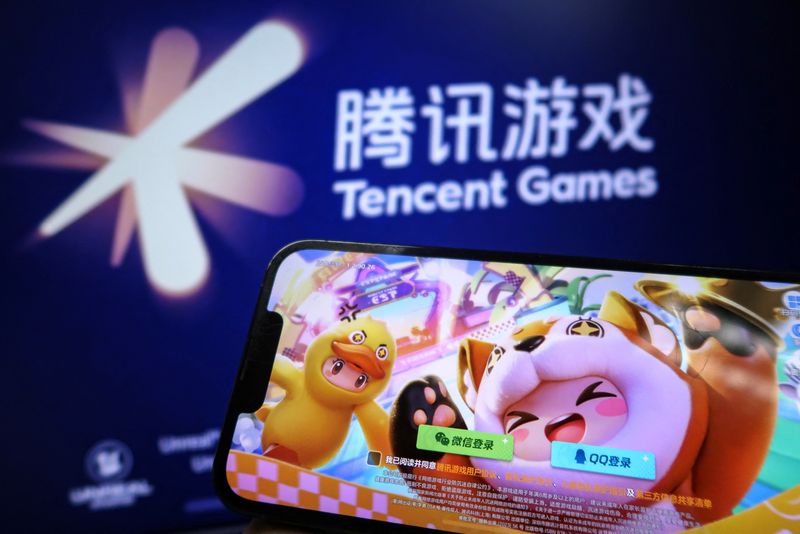By Josh Ye
HONG KONG (Reuters) - In a sea change at China's Tencent, an easy-to-play game of cute characters tackling obstacle courses has taken precedence over developing a big-budget sophisticated foreign franchise for smartphones.
Since late last year, the world's largest video games company has, according to sources, redeployed hundreds of people from the team developing "Assassin's Creed Jade" for mobile - a multi-year project with France's Ubisoft.
They are now working on recently launched "DreamStar" - Tencent's answer to rival NetEase (NASDAQ:NTES)'s hit "Eggy Party" and the company's most high-profile attempt to date at the so-called party game genre which offers simple gameplay, minigames and encourages players to hang out and chat.
As a result, "Assassin's Creed Jade" - an action-adventure game set in ancient China that has been under development for mobile for at least four years - will likely be released in 2025 instead of this year, according to three sources familiar with the matter. They were not authorised to speak to media and declined to be identified.
The redeployment of resources highlights the trends forcing a strategic pivot at Tencent. Firstly, developing big-name Western franchises for mobile phones tends to yield thin margins.
At the same time, rivals have had breakout hits with ostensibly niche products that offer new takes on gaming such as as NetEase's "Eggy Party" and miHoYo's anime-style fantasy game "Genshin Impact". Moreover, the games were developed in-house so their profits are all their own.
Tencent had, for years, great success by developing for smartphones international hits like Activision Blizzard (NASDAQ:ATVI)'s shooter game "Call of Duty" and the battle royale game "PUBG" by South Korea's Krafton.
But such franchise games - called IP (intellectual property) games - are costly to make. Royalty fees of 15% to 20% of sales are typical, Apple (NASDAQ:AAPL)'s App Store takes a 30% cut while marketing and user acquisition expenses can cost another 30% to 40%, the sources said.
After a string of IP game setbacks, Tencent plans to be more selective.
"We're focusing on fewer bigger budget games. Typically, we're seeking to make the biggest bets around games that either iterate on a successful IP ... or games that are iterating around proven gameplay success within a niche and taking those to a more mass market," Tencent Chief Strategy Officer James Mitchell told an earnings call on Wednesday.
Tencent is now also pushing for royalty fees to fall to under 10% of sales in some negotiations, according to one person with direct knowledge of the matter.
"That would have been almost unthinkable just a few years ago. Tencent used to be far more generous," the person said.
Tencent declined to comment on details of its strategic shift.
SETBACKS AND BAMBOO SHOOTS
On Wednesday, Tencent reported a slight decline in fourth-quarter gaming sales and also flagged that overall gaming revenue this quarter would be soft compared with the same period last year when gaming sales surged as pandemic restrictions were lifted.
Pony Ma, Tencent's founder and chief executive, has been blunt that the company's video game division - which last year generated 180 billion yuan ($25 billion) in sales or around 30%of overall revenue - needs to do better.
Competitors have continued to create new products, "leaving us feeling we have achieved nothing," he told a stadium of employees in Shenzhen at the company's annual meeting in January, according to a separate source with direct knowledge of the event.
That month, Tencent also launched its "Spring Bamboo Shoots Project", aiming to incubate in-house games with novel gameplay and offering budgets of up to 300 million yuan ($42 million) per game.
While that is much less than budgets of 1 billion yuan for a major franchise, the initiative signals Tencent is willing to take more risks on non-conventional game design, the sources said.
Some major setbacks have only increased the sense of urgency for change.
Last year, Electronic Arts (NASDAQ:EA) discontinued "Apex Legends Mobile", a game developed by Tencent, with executives at the U.S. firm saying it had fallen short of expected quality.
In December, Tencent axed development of a mobile game based on the "Nier" franchise from Japan's Square (NYSE:SQ) Enix, in part because the Chinese firm struggled to find a compelling monetisation model given its expensive development costs and franchise rights, sources have said.
"Mobile games studios have learned that IP is not the magic bullet for user acquisition it once was," says Serkan Toto, founder of game industry consultancy Kantan Games.
Tencent has also seen a key in-house game bomb. "Undawn", a zombie apocalypse shooting game that Hollywood star Will Smith was hired to endorse, flopped spectacularly despite having a budget of close to 1 billion yuan with more than 300 developers, according to two of the sources.
Last month, one year since its launch, "Undawn" brought in revenue of just $287,000, according to research firm Appmagic.
Western companies have also started to shift away from outsourcing mobile game development to Chinese companies like Tencent. Microsoft (NASDAQ:MSFT)'s Activision Blizzard, for example, has just launched "Call of Duty Warzone Mobile" which will compete directly with Tencent's "Call of Duty Mobile".

Adding salt to the wound, Tencent's top two games saw revenue slide during the week-long Lunar New Year holidays in February. "Honor of Kings" and "PUBG Mobile", which are nine and seven years old respectively, suffered 7% and 30% drops compared to the holiday period last year, according to one of the sources who was briefed on the matter.
($1 = 7.1979 Chinese yuan)